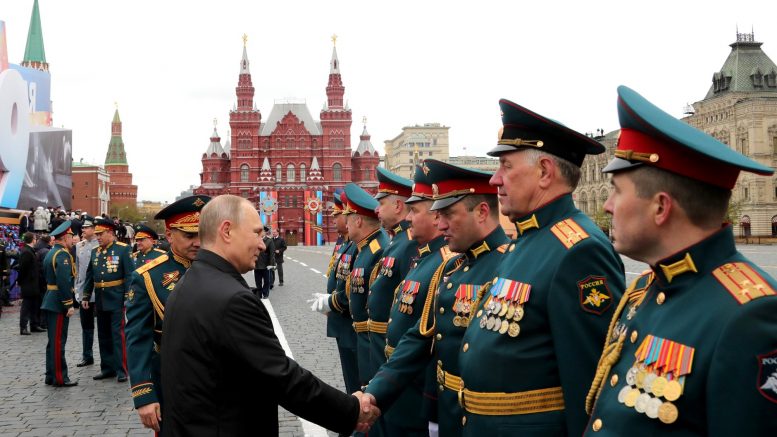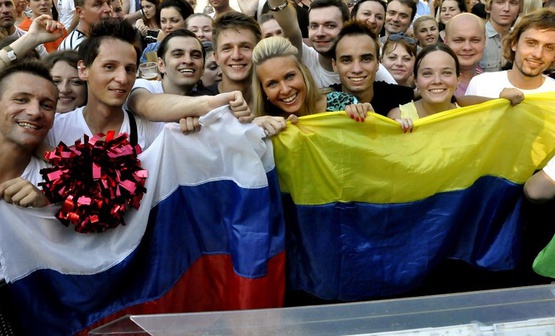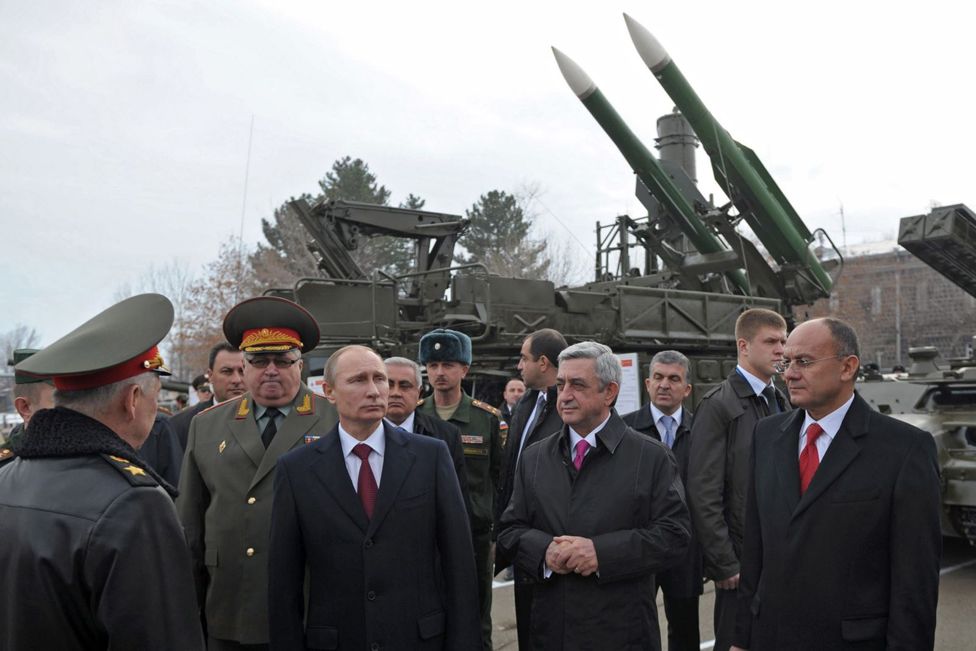Russian propagandists have just perpetrated another abomination against Russian dissident Ilya Yashin and his elderly grandmother. A camera crew from pro-Kremlin media “Life” broke into the nursing home where the sick 84-year-old woman lived, jotted down some of her remarks, then published a story directed against her grandson based on these comments. As Ilya himself remarked, this despicable act became a new low in betrayal and cynicism from Kremlin media. However, it reflects not only the unscrupulousness and omnipotence of Russian propagandists and their Kremlin patrons, but also reveals certain propaganda mechanisms, which, unfortunately, draw so many people into believing media lies.
The philosopher and culturologist Mikhail Epstein wrote in his recent article that the Putin regime and its foreign policy (and hence propaganda) are based on “a pure hatred,” which needs no theoretical justification or ideological doctrine, such as Marxism, racial theory or religious extremism.
“Novichok opened the door to the destruction of the world order – with nothing to stop it. It stripped away the thin veneer of civilization from world politics: Hatred does not need proof; it is in its own way a pure product, like love,” the author writes.
Respectfully, I must disagree with Mikhail. Indeed, Putin’s propaganda does not need logical constructs, and is on the whole extremely contradictory. However, this does not mean that it has nothing to offer its audience except hatred. Yes, hatred is the final product, but in order to maintain itself, Putin’s propaganda also deploys a host of images – and perceptions created by these images – of such intensity that they effectively carry more weight than rational arguments. Russian propaganda does not create a rational worldview, but rather a world of perception that appeals directly to feelings, instincts, reflexes and passions, the intertwining of which serves as justification for the hatred that Epstein writes about. Taken separately, these images and feelings evoke much more than only anger. This propaganda plays on a wide variety of sensations, skillfully reducing them all to the desired result. In previous articles, I have describe the human instincts that are appealed to by various propaganda tactics. Let’s try to summarize them here.
- Fear mongering. First and foremost, Russian propaganda engages in fear-mongering to create an image of Russia surrounded by enemies who are eager to see its complete destruction. The strongest image here is of a future catastrophe – chaos and looting in the streets, destitution, bombs falling from above, dead children, and destroyed houses. Television plunges viewers into an illusory hell, and the only way out of it is unification around the national leader. It cannot be said in this case that the lowest human instincts are exploited – rather, people's reactions to these images are natural defense mechanisms. With all the folly of the artificially created illusory reality, people who buy into this kind of propaganda are more rational and humane than the followers of its other forms.
- Group instinct. Appeal to the group instinct or, on the contrary, individual “elitism.” Even though they seem to be opposites, they are based on the same psychological need – the desire to feel a part of something that is undeniably good. In the first case, it’s a part of a large, cohesive community (“normal people who do not accept fascism,” “the patriotic majority,” “society”); in the second case, it’s a part of “elite groups” (true patriots who have withstood the onslaught of liberal attacks and are prepared to undergo hardships for their homeland; genuine strategists, who understand the subtleties of geopolitics, etc.). The main feeling here is a sense of community and involvement. This social instinct is not inherently something negative, but it is always skillfully used in negative ways by totalitarian regimes.
- Cynicism and cruelty. This kind of feeling, aroused by propaganda, already has a clearly expressed moral dimension, because it plays on the worst instincts of human nature, and is a manifestation of deliberate cruelty. This includes not only “artificial selection,” which allows you to build a career based on denunciations and persecution, but also the phenomenon that some years ago I described as “ideological cynicism” – a creature of the Putin regime. Its adherents believe in propaganda only partially, knowing full well how dishonest it is in other aspects. However, they firmly believe in the postulate: “the end justifies the means,” which in turn becomes the basis of their “ideology.”
Fostering a siege mentality, a state of war with the entire world, is very convenient for such people, since it justifies the basest of their instincts. Their moral standards are extremely amorphous, they basically do not believe in the existence of true democracy, fair elections, independent media, respect for the law, and truth as such. At the same time, they believe that lies, murder, annexation of foreign territories, war, slander and, even the destruction of the entire world – is justified, since “it benefits us.” Belief in the benefits of such behavior is adhered to with greater fanaticism than an exemplary pioneer believes in the righteousness of Marxism-Leninism. The only difference is that instead of talking about class struggle, these people, with the air of experts, talk about “geopolitics” and about whose lives can be profitable for Russia to sacrifice in order “to achieve their goals.” Such reasoning gives them a sense of their own worth and justifies in their eyes any crimes and moral degradation.
It is this striking combination of ideology and cynicism, or, more precisely, cynicism elevated to the rank of ideology that the Putin regime has mastered. Of course, all totalitarian systems are characterized by doublethink, but perhaps nowhere else has cynicism become the foundational worldview, rather than its veiled consequence. The trouble is, the more brazen and shameless the Kremlin lies, the more people begin to subscribe to this kind of philosophy – not through intimidation, not a mistaken idealism, but knowingly – a deliberate cynicism.
- Ends justify means. The story of the exploitation of Ilya Yashin's elderly grandmother is an example of the principle “the end justifies the means." The media attack on his grandmother scraped the very “bottom of the barrel." Here, the most primitive and base human instincts are exploited – the desire to take part in collective bullying, to rummage through someone’s dirty laundry, to pry out a secret, to turn someone else’s life into a show. Viewers of “Dom-2” joyfully wait for these kinds of stories, they yearn for more scandals and gossip, and crave ever new “sensational revelations,” a coveted escape from the monotony of their daily lives. Such propaganda gives them a much-anticipated respite – a “five minute hate break,” as it were, a time of relaxation between the stories of impending apocalypse, a rare opportunity to relax against the background of general moral mobilization and militaristic hysteria.
These kinds of stories serve as a handout from the Putin regime to their electorate, the long-awaited “spectacle,” a reward for their loyalty. TV has finally broken down all moral boundaries, allowing anyone to invade someone else’s life without fear of violating the law, allowing people to joyfully persecute those who the state deems enemies, yet without the burden of personal responsibility, to feel that they are special for being privy to other people’s secrets, and all this – in the name of a “worthy goal” called “it benefits us.”
But perhaps the worst thing about Putin’s propaganda is that its four identified types are very often mixed in the mind of any one person, and it’s very difficult to separate each one out in their pure form. Propaganda gives an average person a whole range of emotions and feelings – from horror and panic to a sense of superiority, from depravity to catharsis, from extreme egoism to fanatical sacrifice. And all these states of mind are intertwined, replaced by one another depending on what makes you feel better at the moment. In this way they justify and rationalize each other.
At the same time, they are all accompanied by such strong images and emotions that not even the strongest narcotic is capable of duplicating its effect. And this effect is capable of influencing everyone, regardless of nationality or political system. For example, even in the United States, with its free media, open access to various sources of information and no generally without repression, there is a fairly large group of people (and not immigrants) who enthusiastically believe in made-up alternate reality, despite facts to the contrary, and, just like in Russia, they too justify any evil and lies.
Propaganda of the 21st century has proved that appealing to images and feelings is more powerful than any ideology and that controlling emotions is much more effective than controlling thinking. And, we're seeing that moral norms are surprisingly easy to destroy.




